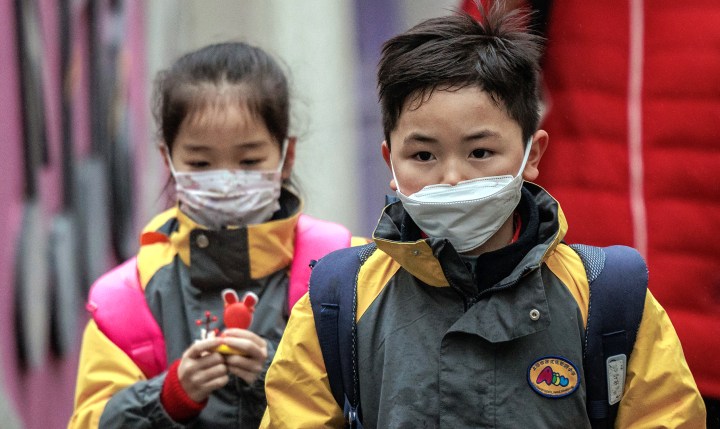PUBLIC HEALTH SURVEILLANCE
WHO seeks clarity on clusters of respiratory illnesses, pneumonia among children in northern China

The World Health Organization announced on Wednesday that they have made an official request to China for detailed information on an increase in respiratory illnesses and reported pneumonia in children.
Ten days ago Chinese authorities announced an increase in cases of respiratory illness and cluster outbreaks of pneumonia specifically among children in that country.
According to the press conference statement, the Chinese National Health Commission attributed this to the lifting of Covid-19 restrictions and the circulation of known pathogens such as influenza, mycoplasma pneumonia (a common bacterial infection which typically affects younger children), respiratory syncytial virus (RSV), and Sars-CoV-2 (the virus that causes Covid-19).
On 21 November, media and ProMED reported clusters of undiagnosed pneumonia in children in northern China. ProMED is the largest publicly-available surveillance system conducting global reporting of infectious disease outbreaks.
In this post, ProMed rapporteur Dan Silver flagged a spike in undiagnosed pneumonia in children in Beijing and Liaoning province adding that other hospitals are “overwhelmed with sick children, and schools and classes were on the verge of suspension. Parents questioned whether the authorities were covering up the epidemic”.
He observed overcrowding in Beijing Children’s Hospital and said the situation in Liaoning province was also serious.
“The lobby of Dalian Children’s Hospital is full of sick children receiving intravenous drips. There are also queues of patients at the traditional Chinese medicine hospitals and the central hospitals,” said a Dalian Central Hospital staff member. “Patients have to wait in line for two hours, and we are all in the emergency department and there are no general outpatient clinics.
“Some school classes have even been cancelled completely. Not only are all students sick, but teachers are also infected with pneumonia.
“Since China stopped adhering to the ‘zero’ policy at the beginning of the year [2023], epidemics such as influenza, mycoplasma, and bronchopneumonia have broken out from time to time.”
Read more in Daily Maverick: New pneumonia vaccine to potentially save thousands of children from death
WHO seeks clarity
The WHO said in their statement issued on Wednesday that it was unclear if these are associated with the overall increase in respiratory infections previously reported by Chinese authorities or separate events.
“On 22 November, WHO requested additional epidemiologic and clinical information, as well as laboratory results from these reported clusters among children, through the International Health Regulations mechanism. We have also requested further information about recent trends in the circulation of known pathogens including influenza, Sars-CoV-2, RSV and mycoplasma pneumonia, and the current burden on healthcare systems. WHO is also in contact with clinicians and scientists through our existing technical partnerships and networks in China.”
The WHO statement continues that since mid-October, northern China has reported an increase in influenza-like illness compared to the same period in the previous three years. China has systems in place to capture information on trends in influenza, influenza-like illnesses, RSV, and Sars-CoV-2 and reports to platforms such as the Global Influenza Surveillance and Response System.
“While WHO seeks this additional information, we recommend that people in China follow measures to reduce the risk of respiratory illness, which include recommended vaccination; keeping distance from people who are ill; staying home when ill; getting tested and medical care as needed; wearing masks as appropriate; ensuring good ventilation; and regular hand-washing. WHO will continue to provide updates.”
Little cause for concern in SA
According to the South African National Institute for Communicable Diseases, the latest available surveillance report for variant tracking, dated 17 November, has not flagged anything new.
Omicron and a handful of its subvariants are still the dominant variants around. Surveillance also found a few cases of the latest variant Eris.
Wastewater surveillance up to 10 November has shown that an increase in Sars-COV-2 particles was detected in wastewater in August. Since the first week of November, levels have come down again. These heightened levels detected in Gauteng, Cape Town and Free State in August.
The NICD’s latest surveillance report for respiratory pathogens has shown a decrease in cases countrywide.
According to this report, the 2023 flu season ended around 10 July. While sporadic flu cases are still detected, numbers remain low.
Some RSV (respiratory syncytial virus) cases are being detected and there still are cases of pertussis in Gauteng, North West Province, Mpumalanga, Western Cape, KwaZulu-Natal and the Eastern Cape.
This week, the WHO’s Covid-19 technical lead Dr Maria van Kerkhove said the Omicron subvariant BA.2.86 has been upgraded from a variant under monitoring to a variant of interest.
“The reason for that is that we have seen a slow and steady increase in its detection around the world,” Van Kerkhove said. She said the change in designation helps to promote surveillance and research.
“We don’t see a change in severity,” she said adding that they only have 3,000 sequences from around the world at this stage.
In South Africa, BA.2.86 constituted 16% of sequences in samples sent for analysis in August, 22% in September and 19% in October.
The Technical Advisory Group from the WHO issued this risk report for BA.2.86 this week:
“BA.2.86 has been reported in multiple countries, and the prevalence has been slowly increasing globally. However, based on the available limited evidence, the public health risk posed by BA.2.86 is currently evaluated as low at the global level. Current population immunity globally remains highly cross-reactive to this variant, especially against severe disease but also against symptomatic disease, and therefore the emergence of this variant will unlikely add increased burden to national public health systems. BA.2.86 was classified as variant under monitoring on 17 August 2023 and based on updated information, BA.2.86 and its sublineages (including JN.1) are now being classified as a variant of interest (VOI),” the report continues. DM




















Comments - Please login in order to comment.